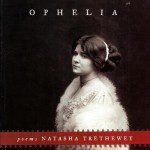New Poet Laureate Writes by the Power and Pain of Memory
By • September 21, 2012 0 2116

Over the phone, Natasha Trethewey’s voice sounds warm. It’s a voice inviting you to talk, as opposed to maintaining the interrogatory stance of an interview.
Thursday, Sept. 13, the tone may change a little, become more authoritative and firm when the poet from Mississippi gives her inaugural reading as the 19th Poet Laureate Consultant—the United States Poet Laureate—at 7 p.m. in the Coolidge Auditorium in the Thomas Jefferson Building of the Library of Congress.
It’s an auspicious, even historical occasion for Trethewey, as the reading marks the 75th anniversary of the library’s Poetry and Literature Center while establishing her as the nation’s most visible and official poet, another landmark in a somewhat meteoric career which has seen her garner and garlanded with achievements and honors, including a Guggenheim Fellowship, the Pulitzer Prize in Poetry for “Native Guard” in 2006 and the Book Prize from the Mississippi Institute Arts and Letters. She is also the current Poet Laureate of Mississippi.
“I was a little bit shocked, truth be told,” she said of being named poet laureate. “It’s a great honor, of course, and I know I’m expected to do the reading and give a lecture at the end of the term. And it will be an opportunity, naturally, to advance the reading, the nurturing, the education and the writing of poetry. I will do everything I can to do that. And it gives me a chance to be here in Washington, where I used to roam the stacks some time ago and did research for my collection, ‘Native Guard.’ ”
In a time of information overload, Trethewey brings a unique gift as a poet of note. In her four collections so far, she has written about people who are often ignored by poetry, the shadowy people who have lived intense and forgotten lives in the midst of history, black soldiers who fought in the Civil War, the servants and nannies of the South, her own relatives, the victims of catastrophe, the ghosts that seem to linger in every tree branch and furrowed field in the South and in her own history.
The history of the South is a treacherous subject to navigate, and her own memories can be equally daunting. “I try to bring memories with me, to air them out, cleanly, vividly,” she said. She has been called “the poet of memory” by some. The Librarian of Congress James Billington chose her in part, he said, because “she intermixes her story with the historical story in a way that takes you deep into the human tragedy of it. It is her ability to weave the present and the past to engage the public and the personal and to give language to the unsaid that makes her poems of such lasting impact.”
Her story is specific: she is the daughter of a bi-racial marriage that was considered illegal, with a white father and an African-American mother, who lived in Mississippi. Her father, himself a poet and writer, and her mother divorced. Later, her mother was murdered by her second husband, who remains in prison. The horrific event led Tretheway to poetry. “It’s when I first thought of being a poet,” she said. “It was an effort to digest, to understand and deal with what happened, and that leads you eventually, to everything else, the atmosphere of Mississippi, the South, the Civil War, the lives of forgotten people.”
Her poetry is by no means stylistically consistent or even recognizable as hers except by its subjects. It has the strange quality of being powerful, deceptively and often simple in its use of words and language, diverse in the method and style. Her words are sometimes discursive, sometimes as haunting as a dream whose meaning is stark and elusive. There are also poems like “Elegy,” written for her father, Eric, to whom she remains devoted. It’s about an episode of fly fishing, daughter and father in boots in the water. It’s a poem that is at once full of atmosphere, and attention to details of her father with her, other things beckoning. “I rewrote quite a bit,” she said. “He says he liked it, and then he said, but it’s strange having an elegy written about you when you’re still alive.”
The past, she thinks, recedes from us, sometimes willfully, sometimes at our behest. “When we lose memory, we sometimes lose it forever. I try to retrieve it, tell stories about things that we don’t always want to think about it.”
Hurricane Katrina figures in her poetry but is also a subject of non-fiction book. “People forget,” she says. “Not Katrina but the havoc and destruction, the loss of living not just life, everywhere, it hit Mississippi with a violence that was different from what happened in New Orleans.”
Talking with her is kind of easy. In some ways, words have a way of taking on understood meanings and stories sound familiar, even universal, shared, especially the more specific they get. She still teaches at Emory University in Decatur, Ga., where her husband Brett Gadsden is a professor specializing in civil rights history. Georgia is also the place where her mother died, where she has made a home, the place of good and bad memories.
“I love teaching,” she says. “I love the fact that so many of the students can be electrified by poetry, want to understand it and do it.”
You might think she writes carefully, digging. “Actually, part of my process is walking my dog, a Boston Terrier named Maggie, and I get a lot of ideas doing that, being with her,” she said. “I think dogs, you look at them and you want to be the person they think you are. They give so much.”
As the new poet laureate, she’s in heady company—Robert Penn Warren, who influenced her work greatly, Philip Levine and others. They comprise a kind of poetic past.
The conversation after a while is like a gift—dogs, the Civil War, fathers and daughters, words in the wind, inspiration in a stream, family, the past. She can handle the past in her writing, where poems become a memory’s gift, such as fishing with her father in “Elegy”:
“I think, by now, the river must be thick
with salmon. Late August, I imagine it
As it was that morning, drizzle needling
The surface, mist at the banks like a net
settling around us—everything damp
and shining. That morning, awkward
and heavy in our hip waders, we stalked
into the current and found our places —
you upstream a few yards, and out
far deeper. You must remember how
the river seeped in over your boots,
and you grew heavy with that defeat.
All day I kept turning to watch you, how
first you mimed our guide’s casting,
then cast your invisible line, slicing the sky
between us; and later, rod in hand, how
you tried — again and again — to find
that perfect arc, flight of an insect
skimming the river’s surface. …”
- Natasha Trethewey | Matt Valentine



